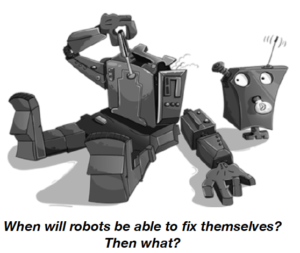 “… computers are now doing many things that used to be the domain of people only. The pace and scale of this encroachment into human skills is relatively recent and has profound economic implications. Perhaps the most important of these is that while digital progress grows the overall economic pie, it can do so while leaving some people, or even a lot of them, worse off.”(1)
“… computers are now doing many things that used to be the domain of people only. The pace and scale of this encroachment into human skills is relatively recent and has profound economic implications. Perhaps the most important of these is that while digital progress grows the overall economic pie, it can do so while leaving some people, or even a lot of them, worse off.”(1)
Erik Brynjolfsson and Andy McAfee – Authors of Race Against the Machine
Cars are already computers on wheels. And in the next stage in the automotive journey, cars will be robots on wheels similar to Transformers. The future? Who knows? I saw a movie the other day about robots. The critical question: ‘Was the robot sentient or in other words, could it feel and think like a human’? Kinda like an advanced Turing robot. Nice idea!
 Story: You’re a knowledge worker. In 3 years, you’re going to have an Alexa or Siri work box next to you. The box has access to all the problem solving and decision making data for your job from your company and similar data the world over. Critical question is: ‘Can your smart Alexa solve your work problems and make smart decisions like you’? A few years ago, smart machines were only able to make simple calculations and decisions based on programmed instructions. If an opportunity was presented that was outside of these instructions, then the machine could not make a decision or solve a problem:
Story: You’re a knowledge worker. In 3 years, you’re going to have an Alexa or Siri work box next to you. The box has access to all the problem solving and decision making data for your job from your company and similar data the world over. Critical question is: ‘Can your smart Alexa solve your work problems and make smart decisions like you’? A few years ago, smart machines were only able to make simple calculations and decisions based on programmed instructions. If an opportunity was presented that was outside of these instructions, then the machine could not make a decision or solve a problem:
“… robots can perform only limited reasoning due to the fact that their computations are carefully specified. Everything a robot does is spelled out with simple instructions, and the scope of the robot’s reasoning is entirely contained in its program. Furthermore, a robot’s perception of its environment through its sensors is quite limited. Tasks that humans take for granted – for example, answering the question, ‘Have I been here before?’ – are extremely difficult for robots.”(2)
Work Lesson Earned: Here’s the conundrum. The above quote is only 4 years old. Several points in the above quote are no longer true. Robots now have cognitive capabilities and smarts than even AI experts had not anticipated. With additional computing power and neural network smarts, the machines can gather data and make predictions based on pattern recognition. Smart machines will make some careers obsolete. Is your career vulnerable?
What’s the solution? Wired Magazine offered this Tech Futures suggestion:
“Today’s collaborative tension between humans and machines is not a binary divide between master and servant—who overthrows whom—but a question of integration and its social and ethical implications. Instead of creating robots to perform human labor, people build apps to mechanize human abilities.”(3)
- Race Against The Machine, Erik Brynjolfsson and Andy McAfee, 2011.
-
‘Becoming Robotics Revolution’, Wall Street Journal, March 11, 2016
3.‘Sci-Fi Writers Imagine the Beguiling Troubling Future of Work’, Wired Magazine, November 13, 2020.